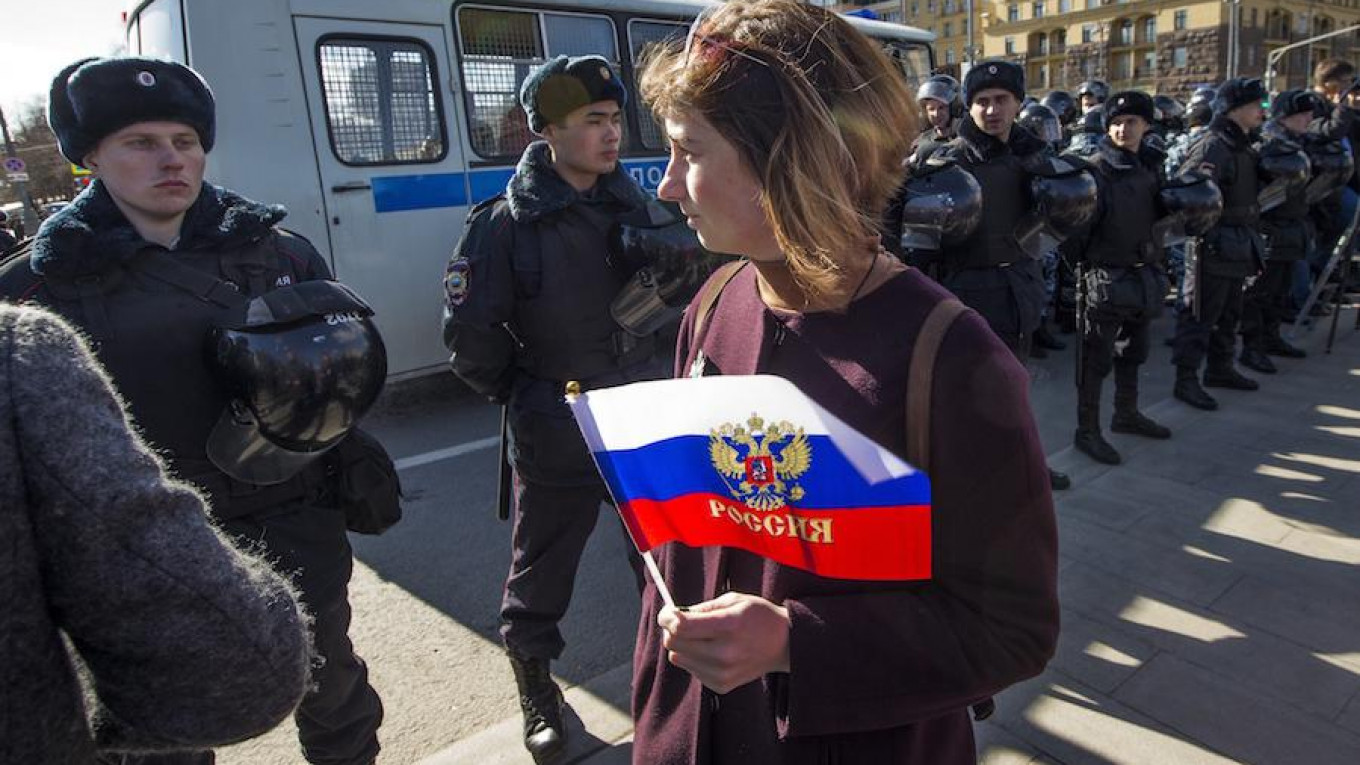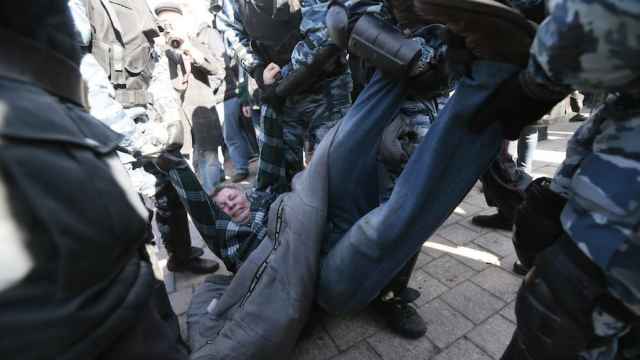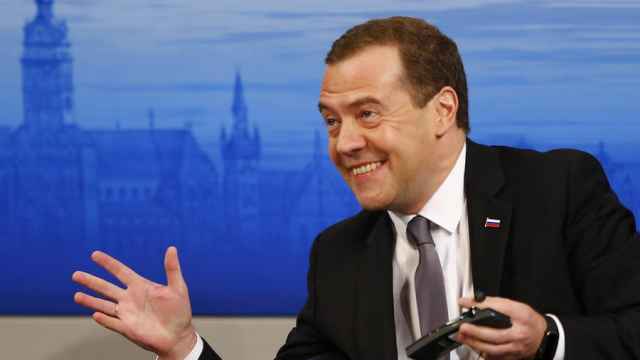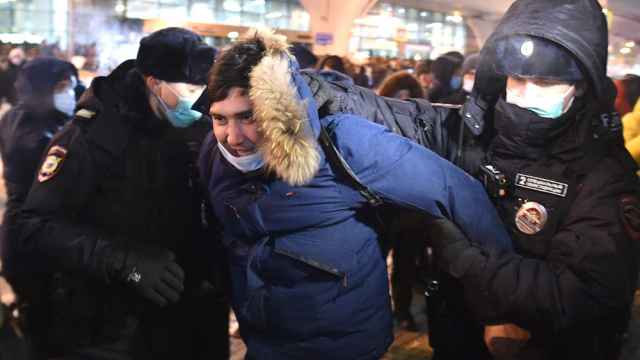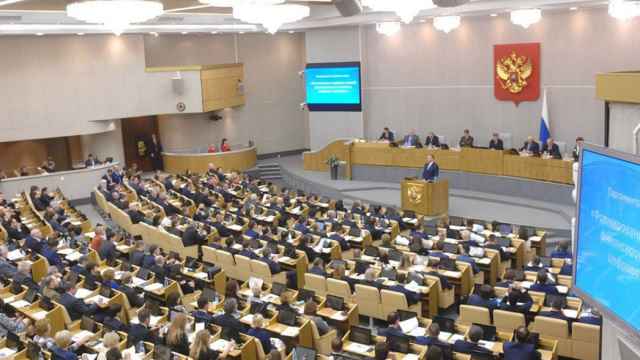After anticorruption protests surged across Russia from the Baltic Sea to the Pacific Ocean in March, the leadership’s self confidence was shaken. A new generation is on the march: younger, more politically informed, and less prone to state propaganda. The survival of the authoritarian Russian regime into the 2020s will depend on whether Putin is able to offer these young people a clear vision of the future. So far there is none.
In late March, political activity unexpectedly seized the country’s attention. More surprising were the supposedly youthful demographics including schoolchildren who took park in the protests. The impression may be subjective. Clear statistics are unavailable and the youth rates in detention are no different from previous years.
But their number isn’t what’s compelling. Whatever the figure, Russia’s youth are more politically visible than ever before. They are also active, and unafraid of making their voices heard. In 2011 and 2012, protesters were mobilized mainly through Facebook. Now, Russia’s homegrown VKontakte, long the preference of the younger generations for social networking, has replaced Facebook as the primary medium for mobilizing protesters.
The youth-oriented Vkontakte has also witnessed a flurry of social commentary as of late. Students in schools and universities around the country have begun filming their teachers instructing them on “how to love their homeland,” undermining the potency of pro-Kremlin propaganda.
These videos show up practically every other day. School children are also taking photographs of questionnaires the intelligence services distributed in schools to uncover anyone from ‘extremists’ to opposition activists. In Tomsk, students also recorded their professor saying that no one is entitled to a state without corruption, and that only fascists protest.
A taste for political activity is awakening in the young, and rekindling among the older generations who were pacified by the trauma of 2012-2013, when the authorities stifled protests and Putin gathered strength.
For five years, the authorities responded to protests with the politics of fear. And they continue to do so. The police and special services are intimidating many activists, threatening them with a loss of their jobs, and students with expulsion from universities. But this tactic may not work.
What do the protesters, and youth, in particular, want today? They want a real fight against corruption, not a fake one. They want a changeable government. School children interviewed by the Russian press said they have never seen anyone other than Putin in charge of Russia, and cautiously hinted that, without the possibility of change, there would be no development in the country. Those feelings were common to the majority of the protesters.
The youth have legitimate concerns. The authorities have provided no positive vision of the future, and so why should they support another Putin term? Secondly, they feel that rules and institutions are more important than political leaders. Finally, they have grown resilient against the politics of fear. The younger generations are tired of rhetoric about external enemies and internal fifth columns, they distrust the idea that the regime is ‘protecting’ them from anything.
The new generation doesn’t watch television. They are therefore apathetic to the state’s primary source of indoctrination. They are also more eager to get involved in social activism. For them, individual rights and the freedom to exercise them are crucial. They are unwilling to tolerate police intimidation and government threats. Unlike Soviet citizens, the current 15 to 25-year-olds are less willing to live under someone else’s dictates. They want to earn a decent living. They see how their contemporaries live abroad and compare life in Russia not with the USSR, but with the United States and Europe.
Generation Z also appears (although there is no firm confirmation yet) to display post-material tendencies. This generation does not remember the financial collapse of the 1990s, and so personal rights are just as important to them as material wellbeing. The dissemination of post-material values, as research by Ronald Inglehart, Pippa Norris and others shows, is a very important condition for democratization.
Whereas previous generations fought for ideology, generation Z is more concerned with their rights. Authoritarianism will only be tolerated if it does not invade this personal space.
Generation Z fears a system in which the rules are unfair. They are tired of people going to prison on trumped up charges while others have the freedom to get away with anything. They are also worried about being dragged into an era of totalitarianism, one in which their individuality is extinguished. Can all these demands be met while opposition is suppressed and authoritarian power remains endlessly in the same hands? In the long run, this is unlikely. But just like the end of the nineteenth century, Russia is at a crossroads: gradual reforms that improve people’s wellbeing, or mounting discontent followed by political upheaval.
A new generation is leading Russian protest, and it is demanding new politics. But in the Russian government, nothing has changed.
Boris Grozovsky is an economic analyst.
A Message from The Moscow Times:
Dear readers,
We are facing unprecedented challenges. Russia's Prosecutor General's Office has designated The Moscow Times as an "undesirable" organization, criminalizing our work and putting our staff at risk of prosecution. This follows our earlier unjust labeling as a "foreign agent."
These actions are direct attempts to silence independent journalism in Russia. The authorities claim our work "discredits the decisions of the Russian leadership." We see things differently: we strive to provide accurate, unbiased reporting on Russia.
We, the journalists of The Moscow Times, refuse to be silenced. But to continue our work, we need your help.
Your support, no matter how small, makes a world of difference. If you can, please support us monthly starting from just $2. It's quick to set up, and every contribution makes a significant impact.
By supporting The Moscow Times, you're defending open, independent journalism in the face of repression. Thank you for standing with us.
Remind me later.



